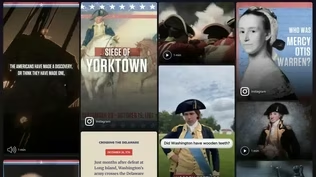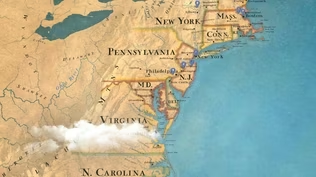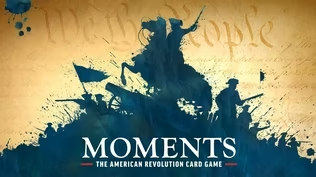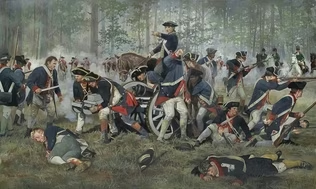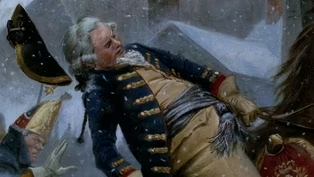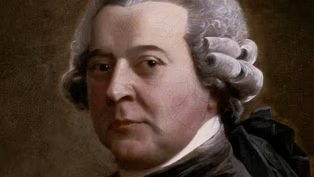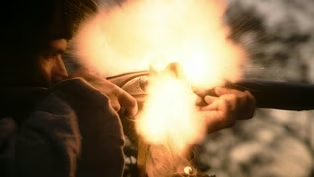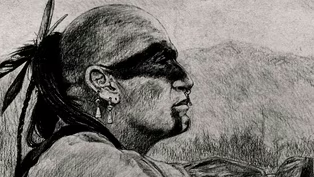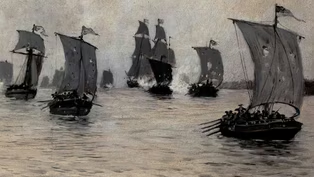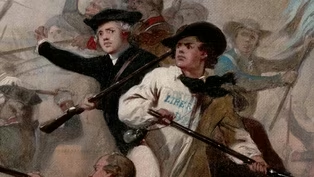
The Battle of Long Island (Brooklyn)
Clip: Episode 3 | 6m 10sVideo has Closed Captions
General Clinton ambushes George Washington in the largest battle of the American Revolution.
Guided by three volunteers in the dark of night, British General Henry Clinton leads 10,000 men to attack George Washington's forces at Long Island. The battle is the largest of the American Revolution, and it turns into a complete victory for the British. However, rather than dealing a final blow, the British stop, giving Washington and his troops time to flee across the river into Manhattan.
Problems playing video? | Closed Captioning Feedback
Problems playing video? | Closed Captioning Feedback
Episodes presented in 4K UHD on supported devices. Corporate funding for THE AMERICAN REVOLUTION was provided by Bank of America. Major funding was provided by The Better Angels Society and...

The Battle of Long Island (Brooklyn)
Clip: Episode 3 | 6m 10sVideo has Closed Captions
Guided by three volunteers in the dark of night, British General Henry Clinton leads 10,000 men to attack George Washington's forces at Long Island. The battle is the largest of the American Revolution, and it turns into a complete victory for the British. However, rather than dealing a final blow, the British stop, giving Washington and his troops time to flee across the river into Manhattan.
Problems playing video? | Closed Captioning Feedback
How to Watch The American Revolution
The American Revolution is available to stream on pbs.org and the free PBS App, available on iPhone, Apple TV, Android TV, Android smartphones, Amazon Fire TV, Amazon Fire Tablet, Roku, Samsung Smart TV, and Vizio.
Buy Now
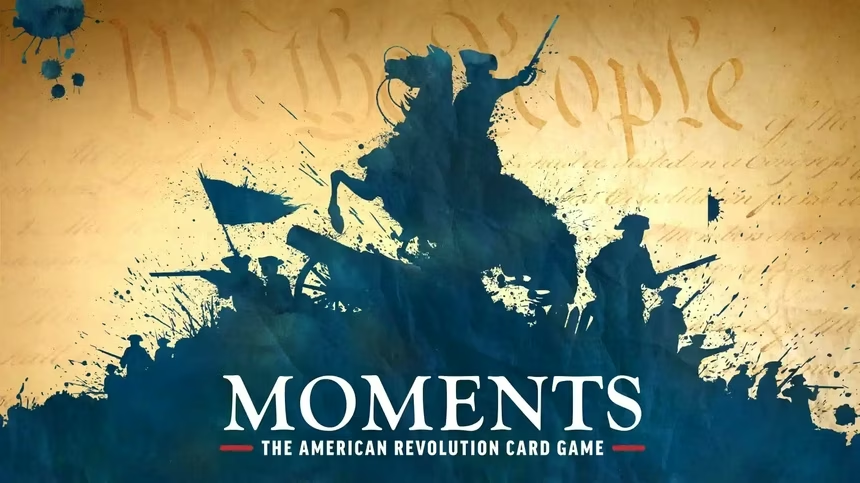
MOMENTS: The Revolutionary War Card Game
Use your knowledge of Revolutionary-era moments to build a timeline of real historical events.Providing Support for PBS.org
Learn Moreabout PBS online sponsorship♪ Voice: We soon landed at Brooklyn.
We now began to meet the wounded men, another sight I was unacquainted with, some with broken arms, some with broken legs, and some with broken heads.
[Martin] Narrator: The fighting Joseph Plumb Martin was about to witness would prove the last and bloodiest of the day.
[Gunfire and shouting] ♪ 3 British columns were now converging on General Alexander and his men on the American right.
He did his best to rally them, but the number of attackers steadily grew.
Alexander fell back, and finally, rather than see his command destroyed, he urged his men to retreat to the village of Brooklyn across the tidal marshes that flanked Gowanus Creek.
Voice: Such as could swim got across.
Those that could not swim sunk.
The British were pouring the canister and grapeshot upon the Americans like a shower of hail.
Many of them were killed in the pond and more were drowned.
[Martin] Narrator: To provide cover for his desperate men and to occupy the British troops firing at them from inside and around an old stone house, Alexander led some 400 soldiers from Maryland into the enemy guns again and again.
Fewer than a dozen of them made it safely back to the American lines.
Alexander himself was forced to surrender.
"The slaughter was horrible," a Hessian chaplain wrote.
"I went over the battlefield among the dead, who mostly had been hacked and shot all to pieces."
At least 200 Americans had been killed, and perhaps a thousand more were captured.
Washington watched this final carnage through his spyglass.
By noon, it was all over.
The British believed they had won what one general called a "cheap and complete victory."
Atkinson: Washington is heartbroken because he recognizes instantly what a catastrophe this has been.
The only saving grace is that enough of them pull back to form sort of an inner defense around Brooklyn that gives the British pause.
They pull back within those defenses.
Now they've got their backs to the East River.
Things are about as dire as they could possibly be.
Narrator: Washington and the bulk of his battered army, crowded now inside the defenses on Brooklyn Heights, expected that at any moment, the British would mount an all-out assault aimed at destroying them.
General William Howe's officers urged him to finish what he had begun, but instead of ordering an assault, Howe stood down.
He knew his brother Richard's fleet was about to enter the East River and prevent the rebels from escaping by water.
The Americans were astonished.
"General Howe is either our friend or no general," Israel Putnam said.
"He had our whole army in his power."
[Thunder, raining] Meanwhile, a storm blew in and continued off and on for the next 2 days.
It kept Admiral Howe's fleet from entering the East River.
By the middle of the second day, Washington decided to try to withdraw his army to Manhattan.
Washington sends out orders that every boat, every fishing smack, every canoe, everything that floats that can be found be brought very secretly and very quietly to the landing, very close to where Brooklyn Bridge now is on the Brooklyn side.
Narrator: To man his mismatched flotilla, he would call on 2 regiments of seasoned mariners and fishermen, Black and White and Native American, from Massachusetts coastal towns.
Colonel John Glover of Marblehead led one of the regiments.
As darkness fell, Washington ordered his men to begin moving silently down from the Heights to the ferry landing regiment by regiment.
Voice: I seized my musket and fell into the ranks.
We were strictly enjoined not to speak or even cough.
All orders were communicated in whispers.
Joseph Plumb Martin.
♪ Atkinson: A providential breeze comes up that allows them to raise sails and get across the East River, and then an even more providential fog rolls in, and it obscures what's happening.
♪ Narrator: All through the night, John Glover and his men from Marblehead sailed or rowed or paddled back and forth undetected, ferrying more than 9,000 men as well as horses, artillery, and baggage wagons to safety in Manhattan.
Atkinson: When dawn breaks, the British realize everyone's gone.
They see the last of the boats disappearing across the river in the traces of fog.
[Cannonfire] And they fire a few shots pointlessly at this retreating gaggle, including Washington in one of the last boats, and the Americans escape to Manhattan Island and get away to fight another day.
♪ Narrator: The Battle of Long Island was the largest battle of the American Revolution.
It had been a devastating defeat for George Washington and the Patriot cause, but his army was still alive.
♪
Video has Closed Captions
Clip: Ep3 | 6m 44s | Washington devises a bold plan to cross the Delaware River and attack Trenton on Christmas night. (6m 44s)
Democracy & The Adoption of the Articles of Confederation
Video has Closed Captions
Clip: Ep3 | 6m 14s | The Continental Congress meets to debate and adopt the Articles of Confederation. (6m 14s)
Preview: The Times That Try Men’s Souls
Video has Closed Captions
Preview: Ep3 | 30s | Washington abandons New York City and flees across New Jersey, before attacking Trenton. (30s)
Tsi'yu-gunsini and the American Revolution on the Frontier
Video has Closed Captions
Clip: Ep3 | 5m 48s | Cherokee chief Tsi'yu-gunsini, Dragging Canoe in English, fights against Patriot settlers. (5m 48s)
Warpath of Nations: The Naval Battle That Prevented a Canadian Invasion
Video has Closed Captions
Clip: Ep3 | 5m 46s | Horatio Gates and Benedict Arnold rush to stop the British sailing down Lake Champlain. (5m 46s)
Video has Closed Captions
Clip: Ep3 | 5m 24s | The British assault Breed's Hill and Bunker Hill near Boston in the bloodiest battle of the war. (5m 24s)
Providing Support for PBS.org
Learn Moreabout PBS online sponsorshipSupport for PBS provided by:
Episodes presented in 4K UHD on supported devices. Corporate funding for THE AMERICAN REVOLUTION was provided by Bank of America. Major funding was provided by The Better Angels Society and...

